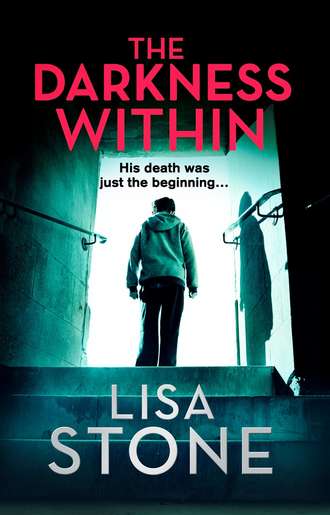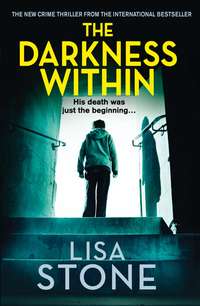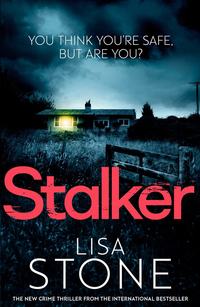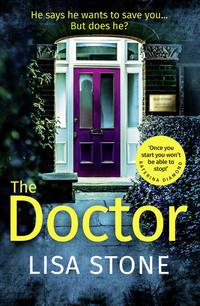
Полная версия
The Darkness Within: A heart-pounding thriller that will leave you reeling
‘That’s not very nice coming from a vicar’s son,’ she joked, aware it wasn’t the patient talking but the cocktail of drugs – particularly potent after a transplant.
As soon as he was fully conscious Jacob returned to his normal self and, still slightly confused, asked politely, ‘Where am I?’
‘You’re in hospital, Jacob,’ the nurse said. ‘You’ve had your transplant and everything is fine. We’re moving you to a different ward soon and your family will be in to see you again later.’
Relieved, he thanked the nurse and then fell into a more natural sleep. The next time he woke, his parents and Eloise were at his bedside, his mother, holding one hand and Eloise the other, while his father stood at the foot of his bed, smiling. The glow from the ceiling light caught his hair, circling his head like a halo, and just for a moment Jacob thought he’d died and was in heaven. After a few seconds, reality hit him, and he remembered what had happened.
Jacob’s recovery continued well and after a few days he was allowed out of bed to go to the toilet, and from then on he was encouraged to walk a little each day. He was very weak to begin with but the doctor and nurses told him that was only to be expected. In addition to undergoing major surgery he’d been weak in the months prior to the operation when his own heart had been failing. He’d only been able to take a few steps before he was out of breath and feeling dizzy, and going to the gym had become a distant memory. But that would change once he was deemed well enough to embark on the supervised cardiac rehabilitation programme run by a physiotherapist in the hospital gym. He was looking forward to gaining some muscle strength and getting fit again.
His chest hurt whenever he moved, coughed or cleared his throat but that was normal too. The surgeon explained that he’d had to cut through his sternum to operate and it was now held together by wires, which Jacob could feel clicking slightly when he moved. It would take six weeks for that bone to heal, during which time, it had been emphasized, he mustn’t put it under any stress, which included not lifting anything heavier than a litre of milk. No pushing, pulling, twisting, or driving, as turning the steering wheel put pressure on the sternum. What would happen if he did exert pressure on it Jacob didn’t want to know. He was already having unsettling dreams about being stitched together like Frankenstein’s monster. The less he was told about what they’d actually done in the operating room or the details of what could go wrong, the better.
He was allowed home three weeks later and it wasn’t a moment too soon. Alone in the single hospital room and with only his parents and Eloise allowed to visit – to minimize the risk of infection – Jacob had developed cabin fever, and knew he was becoming tetchy and short-tempered. To have been holed up for much longer would have driven him mad. For the first week he would have to return to the hospital every day for a check-up, then once a week, then every other week, and then once a month for the first year. After that, assuming he stayed well, his appointments would be every three months for two years and then every six months for the rest of his life. If he had any health concerns he had to return to the hospital immediately. But as he said goodbye to the nurses, thanking them again for all they’d done, returning to the hospital was the last thing on his mind. He was about to enter the world again and with a new heart in place, he intended to live life to the full.
His parents carried his case and bags to the car and he sat in the rear, as his mother took the front passenger seat and his father drove. He put his earbuds in straightaway. He wasn’t being rude but they’d exhausted conversation during his long stay in hospital and they really didn’t have anything left to say to each other.
His mother held his bag of medication protectively on her lap and it wasn’t long before she was sorting through it, reading the instructions on the huge assortment of boxes and bottles. She’d put herself in charge of his medication and had told him she’d bought Dosette boxes. As soon as they were home she’d put the pills he needed for the week into the boxes so none would get missed or taken twice. It had been drummed into them how important it was for him to take the tablets as directed and at the correct times. There were plenty to take: two types of immunosuppressants, antibiotics, blood-pressure-lowering drugs, diuretics, aspirin, anticoagulants, painkillers, and those were only the ones he could remember. Doses of some of them would decrease and even stop over time but he’d have to take immunosuppressants for the rest of his life. If he didn’t take them his immune system would recognize his heart was not his, label it as a harmful invader and attack and destroy it as if it was a virus.
His mother would also be looking after his appointment card for the time being, and the printed handouts containing the lists of post-operative dos and don’ts. They had seen the dietician together and while much of the advice had been common sense – eat low-fat foods, limit cholesterol, salt and sugar intake – others were more specifically for transplant patients: fresh produce had to be washed well before cooking or serving as the bacteria and viruses it harboured could be transmitted to the transplant patient, whose resistance was lowered by the immunosuppressant drugs, rendering them more susceptible to infection. His potassium intake had to be managed, as did his fluid and calorie intake. The dietician had said that his new heart would be put under strain if he carried extra weight, but he’d been fit and healthy in the past so there was no reason why he wouldn’t be again. There’d been so much talk about his new heart that what had once been an innate organ like any other body part had become a living entity in its own right, and he was starting to resent the time and attention it demanded.
But what Jacob hated the thought of most were the biopsies he’d have to have once a week for the next six weeks. He’d already had two and couldn’t stand the thought of more. He had to lie on the operating table while they gave him a local anaesthetic, cut a hole in his neck and pushed a wire down the vein and into his heart to cut out a small piece. It was then sent to the lab and examined for signs of tissue rejection. ‘Transplants aren’t for the faint-hearted,’ his surgeon had said. Arsehole!
It was a little after 3 p.m. and as Jacob gazed out of the side window listening to his music he suddenly realized he was very hungry and craving meat, which was a first. Since meeting Eloise at university he’d become a vegetarian as she was, although he still ate fish, cheese and eggs. But right now, after all that healthy eating in the hospital, he was craving meat: a rump steak or a rack of ribs, rarely cooked red meat that he could sink his teeth into.
‘What’s for dinner, Mum?’ he asked, removing an earbud so he could hear her reply.
She turned to face him. ‘I’ve made a vegetarian cottage pie,’ she said, pleased he was regaining his appetite. This dish had become one of his favourites and she’d put time and effort into making it. ‘Eloise is coming as soon as she can dismiss her class.’ Eloise was a primary-school teacher at a school not far from where she lived with her parents – about an hour away.
‘Any chance of some meat?’ Jacob asked. ‘I really fancy some tonight.’
‘Well, yes, if that’s what you prefer,’ his mother said, surprised. ‘I’ve got some steak in the freezer. I’ll take it out as soon as we get home.’
‘Count me in,’ his father said chummily, glancing at his son in the rear-view mirror. Neither of them were vegetarians except when Eloise joined them for a meal. Jacob knew that given a choice his father would much rather have meat than Quorn or soya beans any day. He threw him a conspiratorial wink in the mirror.
‘Oh Jesus!’ Jacob exclaimed as the rectory came into view. A large Welcome Home bunting was draped across the front of the house and bunches of balloons festooned the porch. ‘Did you have to?’
‘It was your mother’s idea,’ his father said, ignoring the blasphemy. They only used Jesus Christ’s name with reverence.
‘We can soon take it down,’ Elizabeth said, feeling a little hurt. She’d wanted everything to be perfect for his homecoming. ‘I thought you’d like it.’
‘Suit yourself,’ he said with a shrug.
Clearly they were going to have to continue to make allowances during his convalescence. It was almost impossible to imagine how frustrating it must be for a lad of Jacob’s age to have to deal with chronic illness and then a major operation. But at least now he was home, and with time, patience and understanding, nature would do the rest. Allow at least six months, the surgeon had said, then gradually life will return to normal.
Chapter Eight
Mitsy, having heard the car draw up, was now barking furiously on the other side of the front door.
‘She’ll be pleased to see you,’ Jacob’s father said as he finished parking.
‘But remember not to let her lick your face,’ his mother warned. ‘And to wash your hands after stroking her.’
Jacob nodded. More guidelines from the dos and don’ts list to reduce the risk of infection.
His parents carried his bags into the house and Mitsy was immediately at his feet, panting and wagging her tail excitedly. Jacob automatically bent to stroke her and as he did so felt a sharp jabbing pain in his chest. He straightened. It was his own fault; he’d been warned to avoid sudden movements until his breastbone was fully healed. Leaving the dog, he went over and sat in one of the armchairs by the fireside. Another Welcome Home banner hung from the mantelpiece with more bunches of balloons either side. They’d certainly gone to town, he thought, and with a niggle of guilt wondered if he shouldn’t have been more grateful. His mother was now in the kitchen sorting out his medication. She meant well.
‘I’ll take these to your room,’ his father said, picking up his case and rucksack.
Jacob stifled a sigh of frustration, resenting his dependence on them. He watched the fire for a few moments, unsure of what he should be doing now he was home. It felt strange, after all those weeks in hospital. ‘I’m going to my room for a while,’ he said at last.
‘Yes, of course,’ his mother said, stepping in from the kitchen. ‘You’re bound to feel tired to begin with. I’ll bring up your tablets. Would you like a snack and a drink to see you through to dinner?’
‘Just a drink,’ he replied, heaving himself to his feet.
‘Tea, fruit juice, milk? What would you like?’
‘A beer,’ he replied.
She laughed; they both knew he was joking for he wasn’t allowed alcohol, as it would reduced the effectiveness of his medication. ‘Just as well you weren’t a drinker,’ she said. ‘At least you won’t miss that.’
Upstairs, he found his father unpacking his case.
‘Leave that, Dad, I can do it,’ he said.
His father hesitated. ‘OK, but don’t overdo it, son. You know what the doctor said.’
‘I won’t.’
They looked at each other awkwardly for a moment, not knowing quite what to say or do, then his father cleared his throat. ‘Well, if you’re all right for a couple of hours I’ve got some parish business to attend to.’
‘Yes. Go. Do what you normally do. Mum’s here if I need anything. But I must start doing things for myself again.’
‘I know, son. But not too much all at once.’
Jacob nodded and watched him go, then looked around his room before easing himself onto the bed. Almost immediately a tap sounded on the door and his mother appeared, carrying a tray with a mug of tea, a glass of water and his pills in a small plastic pot given to them by the hospital. ‘You look comfortable,’ she said, coming over and placing the tea on his bedside cabinet. She held out the glass of water and pot of pills as if she expected him to take them while she waited.
‘Put them on there,’ he said a little brusquely, nodding to his bedside cabinet.
She did as he said. ‘Don’t forget to take them.’
‘I won’t.’ He yawned.
‘I’ll leave you to rest then,’ she said, and left.
He wasn’t physically tired as she thought – more exhausted from the narrow strip his life had become. He needed some space and time to himself, and he needed to establish some ground rules. He’d been washed, dressed and even taken to the toilet by nurses in the early days. Continuously examined by doctors who discussed him as though he was theirs, so that he felt his body was no longer his own. Everyone seemed to have a claim on it and knew more about it than he did. And all the advice about his recovery, although necessary and well meant, had become suffocating, as was being constantly fussed over, not only by the nurses but by his parents and Eloise. Some blokes might have enjoyed all the attention but he didn’t; it had reduced him to a childlike dependency, humiliating and degrading. It would be a sharp learning curve before his parents and Eloise saw him as an independent bloke again, if he’d ever been one, which he was starting to doubt.
He’d had too much time to think in hospital; indeed there hadn’t been much else to do. He’d spent hours, days thinking about his life – the years before his illness. Gradually he’d come to see that he’d never carved out an identity, a will, a personality of his own. He’d always toed the line, done as he was told and what was expected of him. He’d worked hard at school, learnt to play the organ so he could help out in church, been polite to his father’s parishioners, and had tolerated the down-and-outs and misfits who’d arrived regularly at their door in the city looking for help and a handout. Even as a teenager he hadn’t rebelled. In fact he’d been a bit of a mummy’s boy. And away at university he could only remember one instance of drunk and loutish behaviour, before he’d joined the Christian Union and met Eloise.
Eloise was a nice girl; kind, well-mannered and polite. His parents had taken an immediate liking to her and were soon treating her like the daughter they’d never had. Jacob was looking forward to seeing her again tonight and hopefully having sex – the first time since he couldn’t remember when – sometime before he’d become really ill. When he stayed the night at her house her parents gave them a double room, but when she stayed with him his mother showed her to the guest room. They then had to wait until his parents were asleep before he could creep along the landing and into Eloise’s room to make love to her. Although he apologized for his parents’ Victorian and prudish attitude, he had to admit that the secret risqué nature of their liaison added to his enjoyment.
Tonight, however, there was an additional hurdle to be overcome. The list of dos and don’ts included post-operative sex with the warning that his breastbone mustn’t be put under any pressure until it was fully healed, which ruled out the missionary position – the one they usually used. After some thought Jacob decided that the best way – perhaps the only way – would be for her to sit astride him as he lay on his bed. And as he pictured this, the conservative, rather prim Eloise bouncing up and down on his erect penis, it caused it to come to life. A very good sign, he thought, for one of the possible side effects of his medication was impotence, which would require more pills and be yet another blow to his manhood.
He must have dozed, for he woke with a start to the sound of his mother tapping on his bedroom door again. ‘Eloise is here. There’s no rush. I’ve made her a cup of tea.’
‘I’ll be right down,’ he called, easing himself off the bed and into an upright position. It always took a few minutes after a sleep or a nap for his muscles and brain to start working again; he assumed it was the tablets.
He used the bathroom, combed his hair and checked his face in the mirror before carefully making his way downstairs. Before he’d become ill he’d taken the stairs two or three at a time, but now, aware of what a fall could mean, he made his descent slowly using the handrail. He resented that he had to approach everything with caution and trepidation but for the time being it was unavoidable. As he entered the living room Mitsy ran to him again, panting and wagging her tail, asking to be made a fuss of. Jacob ignored her and crossed instead to Eloise.
‘Good to see you home,’ she said warmly. She knew not to throw her arms around him until his chest was fully healed, so instead she smiled and looked up into his eyes, waiting for him to slip his arm around her as he’d done in the hospital. But he didn’t – he briefly kissed her cheek and then sat in one of the fireside chairs. Elizabeth had come into the living room in time to see her son’s dismissive greeting and the look of disappointment on Eloise’s face.
‘Let’s draw up this chair so the two of you can sit together,’ she said, pulling the matching armchair from the other side of the hearth.
Eloise flashed her a smile of gratitude as together they positioned it as close as it would go to Jacob’s chair and Eloise sat down.
‘Do you want anything, Jacob?’ Elizabeth asked. He shook his head. ‘Eloise, another tea?’
‘No thank you.’
‘I’ll be in the kitchen if you need me. Dinner won’t be long. We’ll eat just as soon as Andrew returns.’
Eloise smiled and thanked her again, then turned to Jacob. He was gazing into the fire that danced in the magnificent inglenook fireplace, part of the original house and now only lit on special occasions or when they had guests staying.
‘So how are you?’ she asked him after a moment.
‘Fine,’ he said without taking his eyes from the fire. ‘How are you?’
‘I’m good, thank you, but it’s not me who’s had the heart transplant.’ She gave a small nervous laugh. ‘Pleased to be home at last?’
‘Of course.’
‘How’s the pain today?’
He shrugged. ‘I just take the tablets if I need them.’
She moved a little closer and rested her hand gently on his arm as she had done for hours and hours in the hospital. ‘How are you feeling in yourself?’ she asked, aware he had been feeling low at times.
He shifted, finding her intensity uncomfortable. ‘OK,’ he said. She seemed to expect more but that was the trouble with women – they expected you to expose yourself, pour out your feelings and vulnerabilities as they did.
There was silence as the fire crackled.
‘I left the teaching assistant to dismiss my class so I could leave early,’ she said, making conversation.
‘Good,’ he said, which seemed to please her. She smiled and, taking his hand in hers, kissed it tenderly.
‘I’ve missed you so much,’ she said.
‘I’ve missed you too,’ he agreed. This was clearly the right thing to say for she beamed at him and kissed his hand again.
Thankfully his father arrived to save him from further conversation. Eloise and he greeted each other with a warm embrace and cheek kisses as they always did. He asked her how she was and how her journey had been and then he went to wash and change, ready for dinner.
Conversation over dinner became easier as he didn’t have to talk much at all. Eloise and her parents did all the talking and he appeared to have been excused, he assumed on the grounds of health. They chattered away non-stop about day-to-day trivia, small talk about nothing in particular, which they seemed to thrive on. He didn’t know how they managed it. All that polite tattle that filled the gaps between eating and seemed to bind them together. Had he ever been part of it? He supposed he must have been, although he couldn’t remember doing it with the enthusiasm they did. He felt like a visitor or alien from another planet as they prattled on, Eloise about the changes in the school curriculum and how it would impact on her teaching and the class’s learning, and his father about the village bypass. He was on the committee and had attended a meeting in the village hall that afternoon – lots of fogies trying to feel important. And as for his mother, she managed to create a storyline out of collecting him from the hospital which he really didn’t appreciate. He frowned. Perhaps he was jealous? Was he envious that they could share this warm comradeship of conversation that eluded him? He’d be the first to admit that he didn’t have anything to tell them, that since his illness and then the operation his life had stopped, and he had nothing new to say. All he could contribute – had he wanted to join in – were remarks about being a patient which they were only too familiar with. But that would change just as soon as he was completely fit and well.
He excused himself from the table straight after pudding at 8.30 on the grounds he was tired – they understood. His mother fussed around him and asked if he needed help undressing, which was embarrassing. Then she produced the plastic pill pot already containing his night-time meds together with a glass of water for him to take up to bed. He called a collective good night to the three of them as he went up the stairs, and guessed they’d probably start talking about him as soon as he’d left the room.
Chapter Nine
‘Jacob’s very quiet,’ Eloise said, her brow furrowing with concern. ‘He’s hardly said a word to me all evening.’
‘Nor to me,’ Elizabeth said gently. ‘But it is only his first day home. Everything must seem very strange, and he’s recovering from a huge operation. It will take time.’
Andrew agreed, and Eloise knew she mustn’t take Jacob’s attitude personally. She remained at the table talking to Andrew and Elizabeth for nearly an hour and then they transferred to the living room to watch the late evening news on television. At 10.30 Eloise kissed them both good night and made her way upstairs. They were lovely people and made her feel so welcome – more than Jacob had done tonight, she thought, but quickly dismissed this as unkind and selfish. Of course it would take time for him to adjust and recover. She assumed he wouldn’t be visiting her room tonight.
Quietly crossing the landing so as not to wake Jacob, she entered the guest room that had become hers. It was comfortable, with a single bed and a faint smell of jasmine from the reed diffuser Elizabeth had placed on the chest of drawers. Over the last few years – since she’d begun staying – this room had gradually become her home from home, and she kept a toothbrush and toiletries in the small en-suite bathroom, and a change of clothes in the wardrobe. She felt relaxed and at ease here, not only in this room but in the whole house.
She washed, changed, and then, yawning, climbed gratefully into bed. The end of the school week was always tiring with the children excitable at the prospect of the weekend, and tonight she’d met heavy traffic on the way over too. But she was here now and there’d be plenty of time to unwind and de-stress over the weekend. She wasn’t returning home until after dinner on Sunday as she had often done before Jacob’s operation. But this time when Elizabeth had telephoned to check she would be staying the whole weekend she’d been concerned.
‘Are you sure it won’t be too much trouble with Jacob just home?’ she’d asked.
‘Don’t be silly, of course not,’ Elizabeth had chided warmly. ‘It will do Jacob good, and you know I always appreciate your company. You already feel like my daughter-in-law.’
This had pleased Eloise immensely. She had always got on well with Elizabeth and had come to feel she had a place in their family, assuming, as Elizabeth did, that one day she really would be her daughter-in-law. Jacob had said as much before his illness – ‘As soon as we’ve saved enough for a deposit on a home of our own I’ll propose.’ So it was an unannounced engagement where they’d implicitly promised themselves to each other and lived their daily lives in the comfortable knowledge that they were a couple. And while their plans to marry had been put on hold with the onset of Jacob’s illness, Eloise had no doubt that once he’d recovered and returned to work, their plans and saving would continue and reach fruition.
With these happy thoughts as bedfellows, Eloise quickly fell into a deep and dreamless sleep. She was fast asleep, lying on her side, when the door to her room silently opened and then closed again. She didn’t stir. The room was pitch black; at the rear of the house there were no streetlamps, just meadows where cows grazed. Outside a thick cloud covered a moonless grey sky so even though her curtains were parted no light shone in.






